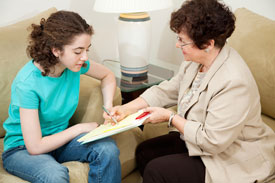Archived Content
The National Institute of Mental Health archives materials that are over 4 years old and no longer being updated. The content on this page is provided for historical reference purposes only and may not reflect current knowledge or information.
Adding Psychotherapy to Medication Treatment Improves Outcomes in Pediatric OCD
• Science Update

Youth with obsessive compulsive disorder (OCD) who are already taking antidepressant medication benefit by adding a type of psychotherapy called cognitive behavior therapy (CBT), according to an NIMH-funded study published September 21, 2011, in the Journal of the American Medical Association.
Background
Several studies have shown that, among adults with OCD, a form of CBT involving controlled exposure to feared situations plus training that helps the person refrain from compulsions is effective both alone and in combination with antidepressant medication. However, few studies of this type of combination therapy have been conducted among children. In addition, many children with OCD tend to respond only partially to antidepressant medication. Studies have found that among adults who only partially respond to antidepressant medication, adding CBT can be effective. However, until now, there have been no studies testing this same approach in youth.
Martin Franklin Ph.D., of the University of Pennsylvania, Jennifer Freeman Ph.D., of Brown University, John March M.D.,MPH, of Duke University, and colleagues set out to determine whether CBT can effectively augment antidepressant treatment in children who partially respond to the medication. Among 124 children ages 7-17, they compared three treatment options:
- Medication management only (MM), prescribed and managed by a physician. All patients were taking a type of antidepressant known as a selective serotonin reuptake inhibitor (SSRI).
- MM plus Instructional CBT (I-CBT), a shorter, less intensive version of CBT administered by the prescribing physician.
- MM plus CBT provided by a trained CBT therapist. The CBT included a type of therapy called exposure plus response prevention (ERP), in which children are exposed to feared situations and taught how to respond to the resulting anxiety without engaging in compulsions.
Results
After 12 weeks of treatment, nearly 69 percent of those receiving MM+CBT had responded to treatment, compared to 34 percent receiving MM+I-CBT and 30 percent receiving MM. Those receiving MM+CBT showed more improvement in all respects, compared to those receiving MM and MM+I-CBT.
Significance
The findings are consistent with other studies demonstrating that ERP is an effective treatment strategy for OCD, both alone and in combination with SSRIs. The researchers conclude that the full version of CBT with ERP should be widely disseminated as opposed to a brief version that may not be effective.
What’s next
The researchers were unsure why there was so little difference in treatment response between the MM group and the MM+I-CBT group. They reasoned that the I-CBT was generally ineffective because it was brief and less intensive than the CBT. It also did not include key treatment components that are central to the full CBT protocol, such as exposure practices during the treatment sessions themselves. Future efforts should focus on making the full CBT with ERP more widely available in community settings, they concluded.
Citation
Franklin ME, Sapyta J, Freeman JB, Khanna M, Compton S, Almirall D, Moore P, Choate-Summers M, Garcia A, Edson AL, Foa EB, March JS. Cognitive behavior therapy augmentation of pharmacotherapy in pediatric obsessive compulsive disorder: the Pediatric OCD Treatment Study (POTS II) randomized controlled trial. Journal of the American Medical Association. 21 Sept 2011.
